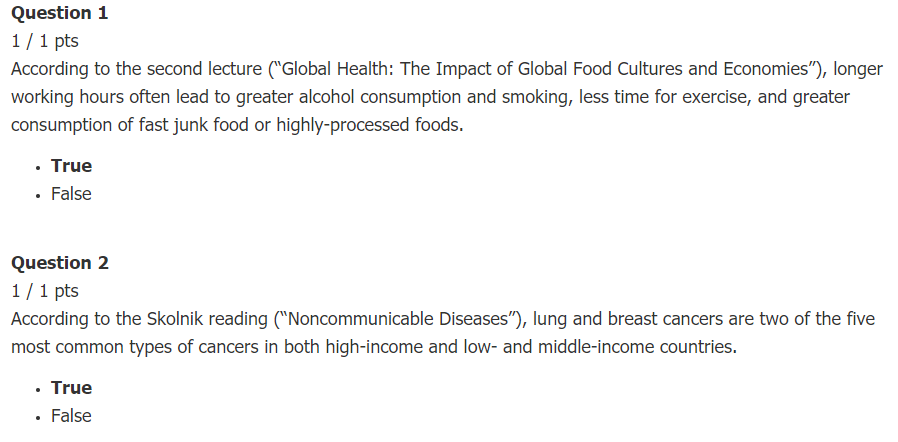(Solved): ASB 378 Module 7 Quiz : Score for this quiz: 17 out of 17 : Submitted Apr 23 at 4:02am...
ASB 378 Module 7 Quiz
Score for this quiz: 17 out of 17
Submitted Apr 23 at 4:02am
This attempt took 38 minutes.
Question 1
1 / 1 pts
According to the second lecture (“Global Health: The Impact of Global Food Cultures and Economies”), longer working hours often lead to greater alcohol consumption and smoking, less time for exercise, and greater consumption of fast junk food or highly-processed foods.
- True
- False
Question 2
1 / 1 pts
According to the Skolnik reading (“Noncommunicable Diseases”), lung and breast cancers are two of the five most common types of cancers in both high-income and low- and middle-income countries.
- True
- False
Question 3
1 / 1 pts
According to the Skolnik reading (“Noncommunicable Diseases”), which of the following is not included in the five priority areas to reduce the global crisis of noncommunicable disease?
- Tobacco
- Salt
- Sugar
- Harmful alcohol intake
Question 4
1 / 1 pts
According to the Skolnik reading (“Health, Education, Poverty, and the Economy”), health outcomes depend only on how much money countries spend on health.
- True
- False
Question 5
1 / 1 pts
According to the Skolnik reading (“Health, Education, Poverty, and the Economy”), there is no strong association between ethnicity and health status in most countries.
- True
- False
Question 6
1 / 1 pts
According to the second lecture (“Global Health: The Impact of Global Food Cultures and Economies”), although the number of infectious diseases has dropped in the past two decades, deaths caused by non-communicable diseases have risen.
- True
- False
Question 7
1 / 1 pts
According to the second lecture (“Global Health: The Impact of Global Food Cultures and Economies”), the Mediterranean diet has been adopted by a number of people living outside the Mediterranean area.
- True
- False
Question 8
1 / 1 pts
According to the Skolnik reading (“Health, Education, Poverty, and the Economy”), all high-income countries, except the US, have some type of mandatory and universal health insurance system.
- True
- False
Question 9
1 / 1 pts
According to the video (“Globesity: Fat's New Frontier”), which country is not mentioned as having obesity issues?
- India
- France
- Mexico
- China
Question 10
1 / 1 pts
According to the video (“Globesity: Fat's New Frontier”), which drink is aggravating health conditions of people in Chiapas, Mexico?
- Whole Milk
- Coffee
- Coca Cola
- Corona beer
Question 11
1 / 1 pts
According to the Skolnik reading (“Health, Education, Poverty, and the Economy”), only economic development can improve the health condition of a society.
- True
- False
Question 12
1 / 1 pts
According to the Skolnik reading (“Noncommunicable Diseases”), because of rapid economic growth, current low-income countries will not have to deal with the challenge of addressing noncommunicable disease and communicable diseases at the same time.
- True
- False
Question 13
1 / 1 pts
According to the Skolnik reading (“Noncommunicable Diseases”), men in Europe and Central Asia have the lowest rates of high-risk drinking.
- True
- False
Question 14
1 / 1 pts
According to the third lecture (“Global Health: The Impact of Global Inequalities and Injustices”), some Americans have adopted what is called the Paleolithic diet based on naturally-occurring foods.
- True
- False
Question 15
1 / 1 pts
According to the video (“The next outbreak? We’re not ready”), which of the following is the reason why Ebola didn’t spread more?
- A lot of heroic work by the health workers
- Ebola does not spread through the air
- It did not get into many urban areas in West Africa
- All of the above
Question 16
1 / 1 pts
According to the first lecture (“Global Health: Global Migration and Infectious Disease”), pandemics refer to the spread of infectious disease to a large number of people.
- True
- False
Question 17
1 / 1 pts
According to the Skolnik reading (“Noncommunicable Diseases”), men smoke more than women do in all regions of the world.
- True
- False
Expert Answer

Buy This Answer $15
-- OR --
Subscribe $20 / Month
